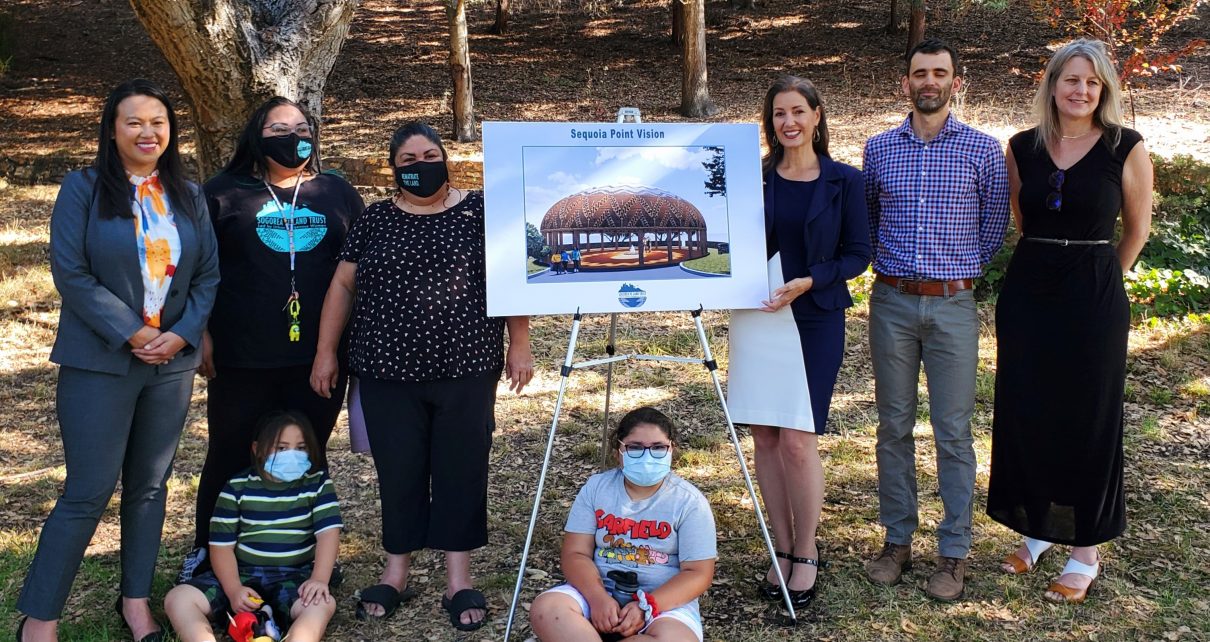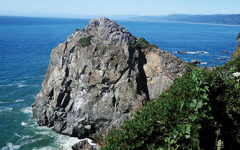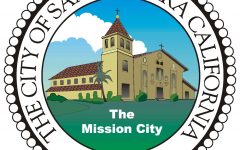
Oakland City officials and tribal representatives at the ceremony in Oakland on 9/8/2022. (Photo: Oakland.ca.gov)
Oakland Gives Back Land Rights ‘Reparations’ in Park to Native Tribe
Experts says ‘reparations’ act more like a free long-term rental
By Evan Symon, September 9, 2022 5:02 pm
Oakland became the first city in the United States to give city-owned land rights back to a Native American tribe for reparations due to European colonization on Thursday, receiving partial control of five acres of the Joaquin Miller Park.
According to the cultural conservation easement, while Oakland would retain ownership of the five acres, the East Bay Ohlone Tribe and the Sogorea Te’ Land Trust would otherwise control how the land is used for cultural, environmental, and educational purposes. The agreement became the first victory for the land trust, who has been trying to get land reparations since 2015.
“This is a way for us to take this land and reimagine what it might have looked like,” said co-director of Sogorea Te’ Corrina Gould at a press conference at the park on Thursday. “We have a vision of a place in the hills that overlooks our territory, that holds us in a basket. It’s a way for us to tell our story as Lisjan people, and to engage our relatives from all walks of life into stewarding this land.”
The site itself has been undergoing negotiations since 2018. That year, Mayor Libby Schaaf had asked the tribes if there was anything she could do to help them regain land of cultural importance, leading to that site being selected by the tribe and Oakland City Councilman Sheng Thao to also back the plan.
“Today we are letting healing begin,” stated Schaaf at the press conference. “Today is the day when we acknowledge the harm that government and colonialization has done to the first people of this land. The original sin of Native genocide that happened right here on this land was just the beginning of additional exclusionary laws and acts that have happened over generations.”
Thao also added that “This is just the beginning, this is just the beginning. I truly believe that it was your ancestor who led your daughters to this beautiful site. This perfect site that overlooks the city of Oakland.”
Problems with park “reparations”
However, many in Oakland felt the handing over of five acres to the tribe was wrong, due to it being city-owned land and not federal land which can be be set aside through the Bureau of Indian Affairs.
“They just gave it up? Like that?,” asked Michael Sweeney, one of the closest residents to the park, to the Globe on Friday. “So it was something for everyone given to something that can be enjoyed by a few? How do they not see the problem with that logic? Are we going to see lower taxes because of less land to upkeep now?”
Park experts also downplayed the “reparations” angle the city tried to promote, instead noting that it was like a long-term free rental.
“Now, what Oakland did was like someone adopting a highway, but without them paying for the upkeep,” explained Melissa Gomes, a parks and recreation expert from New York, to the Globe on Friday. “In the end, the city does still own the land, but the tribe can do ceremonies and things there now. There is no transfer of deeds or anything. Actually, it’s more of a gesture than reparations.
“This kind of thing actually happens all over. Someone who owns land near a place of cultural or historical importance, like here in New York, gets contacted by a tribe wanting to do a ceremony or something on the land. So they agree, paperwork is drawn up, and it happens. The tribes are good about recognizing land ownership and the land owners are good about recognizing that they weren’t the first ones there and that it may hold significance for them.
“The only difference in Oakland is that the five acres are now kind of quasi-owned by the tribe, and that the agreement is in perpetuity. It’s really like a free long-term rental, like a company car. And even though no one dared say it, that agreement can be stopped at any time by the city.”
Other similar agreements may occur soon between tribes and other cities in California.
- Bill to Require Law Enforcement Disclosure if AI Was Used To Help Write Reports - August 7, 2025
- Gov. Newsom Files FOIA Request To ‘Expose True Cost’ Of L.A. Federal Troop Deployment for Anti-ICE Riots - August 6, 2025
- California Redistricting: How Newsom’s Plan Will Demolish Hard Fought GOP Gains - August 6, 2025





Another “gift” to create a taxable card room or casino? Who gets the kick backs? There used to be a time when people were concerned about gambling addiction. Apparently it is not a concern when the “tribes” are involved?
Exactly what I was thinking the next Casino will be coming to Oakland
Raymond, None of the Ohlone tribes, whose traditional homelands stretch from Northern Monterrey County to San Francisco and Northern Contra Costa County have federal recognition, so they are not in a position to own and operate Casinos, nor would building a casino there be of interest to the Ohlone who received this parkland. Moreover the reasons that at least sixty tribes indigenous to California lack federal recognition suggests that this gesture from the City of Oakland to the community of surviving families of a once substantial population that consisted of well over 20 villages worth of people is, in perspective, a very small gesture that is long overdue and will create no changes to Oakland’s current tax base. In fact, to put this tiny transfer of open space into some historical perspective, in the nineteenth century it was not only legal to massacre indigenous tribal peoples, the State of California, with help along the way from the US government, spent 1.2 million dollars (not adjusted to its contemporary equivalence) to support militias to massacre indigenous tribal peoples and to pay bounties for the heads and ears of indigenous Californians who were not threatening anyone. They just happened to be living on lands where their ancestors had lived for millennia that newcomers wanted for their own to live on, farm, mine and refine gold on. The ancestors of those Ohlone who are alive today retreated to hidden canyons (such as Indian Canyon near Hollister) or had learned Spanish so they could pretend to be Mexican (the Ohlone to whom the City of Oakland has turned over this parkland) . That we have so many small indigenous tribes living in our state today masks the fact that whole tribes were wiped out by our State’s official, legislated policies (Today there are ~108 tribes with federal recognition, not all of whom are gaming tribes, and another ~60 tribes with no federal recognition). Moreover, at the same time during which the State of California was handsomely supporting those who failed to strike it rich at gold mining by paying them to kill our state’s original inhabitants, the Federal Government negotiated treaties with 17 different groups of indigenous Californians. However, unlike treaties with tribes across almost all the rest of the US, when those treaties arrived in Washington DC to be ratified, instead of being ratified, they were hidden away in a closet and forgotten until someone came across them by chance about sixty or seventy years later (~1910). This last happened because powerful Caucasians from California did not want to designate any land for our state’s original inhabitants and lobbied aggressively in Washington against the ratification of those treaties. In the interim, in honor of the treaties they had signed, indigenous Californians moved to the lands for which they had negotiated. However, because those treaties were not ratified, they found their newly negotiated lands lands were not considered theirs so many tried to return to the lands that they had left for the treaty lands only to find that settlers had moved onto and claimed the lands they had originally been living on. This side of California history is rarely taught (it doesn’t serve our self image as a wealthy compassionate state), but if you can allow yourself to be open to some of California’s historical reality, you’ll find you do not need to be a genius to find the details of particular massacres of particular tribes (e.g., Elem Pomo along with a second band of Pomo who lived on islands in Clear Lake) and particular tribes who moved to lands they had negotiated treaties for, not been acknowledged to own them, moved back to the lands they had left, and because of aggressive settler encroachment, found their original village lands were now occupied by others and that they were without lands to live on.
Unctuous, frothy emotionalism without moment or meaning. What a fkn-joke! Fitting for Oakland/Berkeley area, though.
Looks more like virtue signaling than reparations.
That’s prime real-estate right next to Redwood Park. If it was real reparations and not a phony conservation land trust feel good legalese nothingburger, they’d hand over development rights and the tribe could cash out on a new subdivision.
Thomas, this “reparations” nothingburger virtue signaling is simply the first step. After they have milked the “gift” for all of the positive public relations they can, and the public attention declines, after a while the tribe will be given the development rights and cash out. The developers are now getting ready and licking their chops. In Hawaii, the Native Hawaiian graduates of the Kamehameha School (Bernice Pauahi-Bishop Estates) were given parcels of land as gifts. These young kids, for obvious reasons, would sell their land gift to developers who were lining up at their doors. Each of the three trustees of the Bishop Estates had salaries of over a million dollars per year. Nice racket, no? Don’t know if the gifts are still being given; they may have stopped doing this. A lot of that land is now being covered with lava flows – poetic justice?
P.S. Maybe not so “poetic”. The Hawaiian goddess of fire, Pele, just got mad and took the land back?
It’s always possible that I’ve missed something, but to the degree that I am familiar with the priorities of the few surviving Ohlone families who’ve accepted this land as a conservation land trust, they do not share your perspective or vision.
To say that “Oakland became the first city in the United States to give city-owned land rights back to a Native American tribe for reparations …” involves a nuance that is only accurate because the city did not turn over the title to those acres to the East Bay Ohlone Tribe and the Sogorea Te’ Land Trust. By contrast, in the fall of 2019 the city of Eureka gave to the Wiyot, without restrictions, the title of their remaining ~200 acres on Indian Island in Humbolt Bay, and the island has since been formally renamed Tuluwat Island.